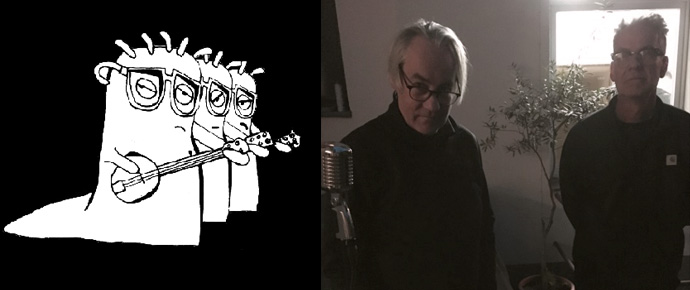Our German bluegrass buddies, The Wortmann Brothers, have shared another of their clever songs, played in their own distinctive primitive bluegrass style.
The brothers, Frank on guitar and mandolin and Ulrich on banjo, have been involved with bluegrass since they were in college when they first came upon banjo music. The two, both high school teachers, continue to play together and write wonderfully sardonic songs in a traditional bluegrass form.
This latest is called Schnaps und Gefühl, which translates as Liquor and Feelings, about how the two never mix well.
Watch the video, and check out Ulrich’s translation below if your German is a bit shaky..
| Du standest vorne weiter am Tresen
Das Glas vor dir, das war schon leer Ich dachte’ das Schicksal würde grüßen Ich trank nen Schnaps und du noch mehr Refrain: Schnaps und Gefühl das sind zwei Pferde Auf die ein Sattel niemals passt Schnaps und Gefühl das sind zwei Esel Aus denen du besser Würste machst
Wir trafen uns auf ner Cocktailparty Wir waren so zu wie es nur ging Mit Tunnelblick sah’ aus wie Liebe Beim Tageslicht war alles hin
Beim Häppchen an der Häppchentheke Hauchtest du leise, dass du mich magst Sechs Schnäpe später wuste ich die Antwort Dein Blick war wässrig ich sprach ins Grab |
You’re standing next to the counter
The drinking glass in front of you was already empty I was thinking the destiny is giving a sign I took a liquor and you even more Chorus: Liquor and feeling thats two horses On which one saddle never fits Liquor and feelings thats two donkeys You better make sausages from it
We meet at a cocktail party We were as drunk as drunk can be With tunnel vision (of alcohol) it looks like love With daylight it was all gone
While having an appetizer at the appetizer counter You whispered gently that you like me Six liquors later I knew my answer Your glance was teary, I was talking to a grave |
Ulrich also shared a translation of he and Frank’s exchange at the beginning of the video. He calls it “brother talk.”
| “Nochmal, da, bei dir war das rhythmisch falsch!”
“Nein”- “Okay, schniief.” “Ich kann das gar nicht rhrytmisch falsch machen.” |
“Let’s try again, you got the rhythm wrong!”
“No” “Okay, (sniffing)” “I can’t play rhythmically wrong.” |
You’re welcome.
